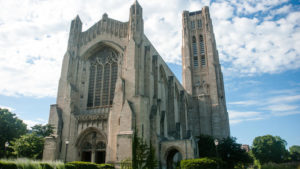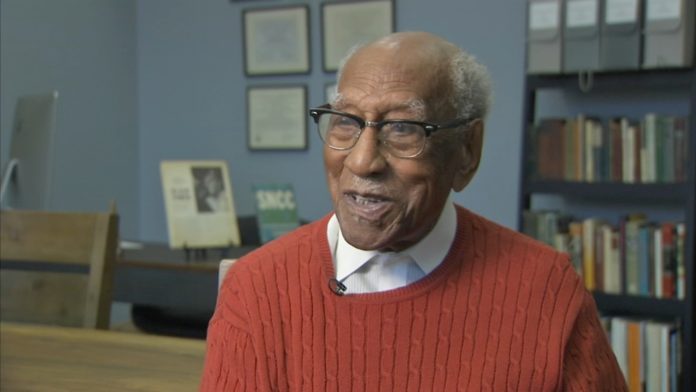Program on December 5 at Rockefeller Memorial Chapel will open with African ancestor salute
The public memorial for historian and civil rights leader Dr. Timuel Black will be held at 3:30 p.m. on Sunday, December 5, at Rockefeller Memorial Chapel on the campus of the University of Chicago. The doors will open at 3 p.m., and guests must show their vaccination status or a negative COVID test, which was completed 72 hours prior to the event. All attendees must wear a mask while indoors.
Due to limited capacity, related to COVID-19 precautions, registration is limited to the first 450 persons. The event will be live streamed in its entirety and a link will be publicly available.

The program will open with a traditional African ancestor salute with African drumming and dance, followed by libations and an interfaith prayer.
Musical offerings include Chicago Jazz Philharmonic’s co-founder trumpeter Orbert Davis’ Quartet playing Louis Armstrong; vocalist Tammy McCann; Jazz Institute of Chicago’s Jazz Links Ensemble; jazz vocalists Maggie and Africa Brown and Dee Alexander, and gospel diva Cathy Townsend with young diva Ajene Cooks, accompanied by pianist Robert Irving III.
Governor JB Pritzker and Mayor Lori Lightfoot are among the speakers at the service. Others will address Black’s work in political and labor organizing, his work as an historian and his work in education.
Black died October 13, two months before his 103rd birthday. A viewing was held at A.A. Rayner Funeral Home before a private memorial took place on October 23 at First Unitarian Church of Chicago, where Father Michael Pfleger gave the eulogy before many prominent dignitaries that included Mayor Lori Lightfoot and Cook County Board President Toni Preckwinkle.
Over the years, Rockefeller Memorial Chapel has hosted memorials and funerals for several prominent Blacks, including Olympic champion Jesse Owens, Pulitzer Prize-winning author Gwendolyn Brooks and Johnson Publishing Company founder John J. Johnson.
Politicians and community leaders remember Black as a courageous trailblazer and a scholar of Black Chicago history. Black was also credited with the election of Harold Washington as the city’s first Black mayor.
The Illinois Legislative Black Caucus, through the Illinois House of Representatives, issued a House Resolution to recognize Black for his local and national work in the Civil Rights Movement.
Black was born in Birmingham, Alabama, on December 7, 1918. His family became part of the first wave of the Great Migration as they settled in Chicago in 1919. A nationally respected educator, political activist, community leader, oral historian, philanthropist and philosopher, Black lived on the South Side since his family moved to Chicago over 100 years ago.
He attended Edmund Burke Elementary School and DuSable High School. Black worked as a paperboy for the Chicago Defender. During the Great Depression, Black worked as a delivery boy for a local grocery store where he learned about community organizing. He would later organize the “Don’t Spend Your Money Where You Can’t Work” campaign in the 1930s.
That campaign led to the creation of the Negro Retail Clerks Union. In the 1940s, Black was an active organizer of the Congress of Racial Equality (CORE), which worked to desegregate Chicago department stores.
Black served as a Chicago high school teacher from 1955 to 1966. He first taught at DuSable High School, then at Hyde Park High School, where he established an African History Club for students.
During World War II, Black served in the U.S. Army and was awarded four battle stars and the Croix de Guerre, the highest military honor given to non-citizens by the French government. After the war, Black earned a bachelor’s degree from Roosevelt University and later obtained a master’s degree from the University of Chicago.
In 1955, after seeing Dr. Martin Luther King on television, Black abandoned his doctoral studies at the University of Chicago to become an active participant in the Civil Rights Movement. He served as the Chicago chair of the historic 1963 March on Washington.
Black was one of the first African Americans in Chicago to challenge the “Regular Democratic Organization” and coined the phrase “plantation politics.” He ran for public office several times and was a leader in the massive voter registration campaign that led to the election of Harold Washington as Chicago’s first Black mayor.
Black published “Bridges of Memory: Chicago’s First Wave of Black Migration,” which chronicled the history of Black Chicago from the 1920s to the present.
After decades of teaching at high schools, mostly in Chicago, in 1975 Black became a professor of sociology, anthropology, and Black history at Loop College, which was later renamed Harold Washington College.
Washington, a friend of Black’s from his youth, in 1982 represented their neighborhood in the House of Representatives. Black and others suggested that he run for mayor. In his memoir, “Sacred Ground: The Chicago Streets of Timuel Black,” Black recalled that Washington laughed in response. Black said that Washington accepted his challenge on the condition that Black register 50,000 new Black voters and raise $100,000.






